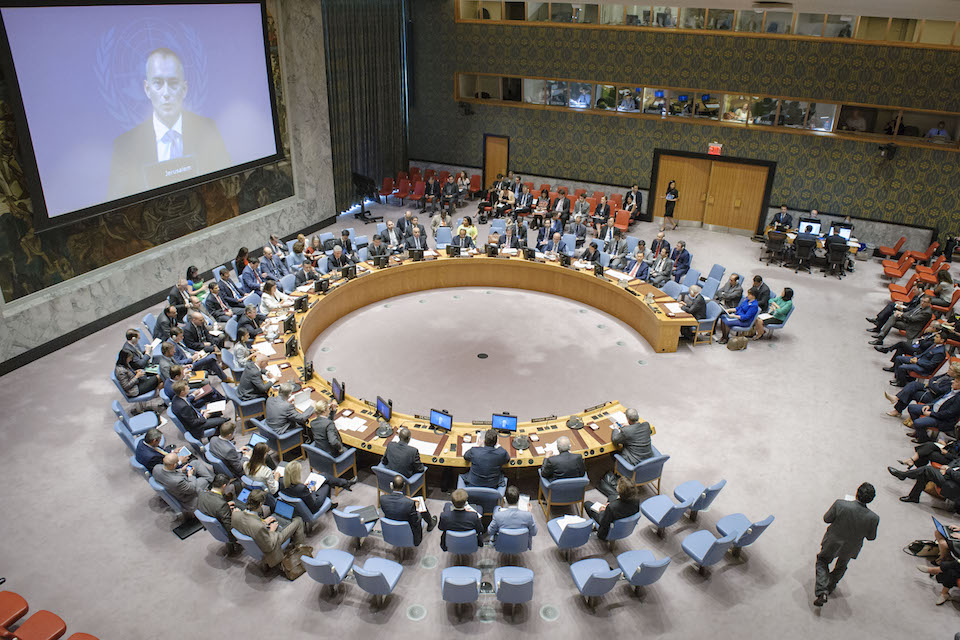"Support for a two-state solution is the only way to ensure a just and lasting resolution to the Israeli-Palestinian conflict."
Statement by Ambassador Peter Wilson, UK Deputy Permanent Representative to the United Nations, at the Security Council briefing on the Middle East Peace Process

Thank you Mr President,
I join others in welcoming our briefers this morning, and I thank SRSG Mladenov for his second report on the implementation of resolution 2334 and for all his tireless work.
As each briefer has made clear, the Middle East continues to face an unrelenting human tragedy of multiple conflicts and rising tensions. For many in the region, it’s a tragedy that has gone on for over half a century.
We recognise that the anniversary of the war of 1967 holds great significance for all sides of the Arab-Israeli conflict. For Israelis it marks the anniversary of a war from which Israel emerged victorious, against all the odds. For Palestinians it marks an enduring tragedy of 50 years of occupation; 50 years without self-determination.
Let’s be clear; half a century of Israeli occupation in the West Bank and Gaza is a tragedy for all sides; a tragedy for Palestinians who yearn for independence, and a tragedy for Israelis who yearn for peace and security. And it’s a tragedy that has been exploited, with terrorist groups such as Hamas and Hizballah cynically manipulating the narrative of occupation for their own ends.
Mr President, so many decades of violence, loss, anger and hate only proves that conflicts cannot be managed or contained in perpetuity. So this year we must move towards peace, with the support of the region and the international community, rather than continue towards an uncertain and dangerous future.
Support for a two-state solution is the only way to ensure a just and lasting resolution to the Israeli-Palestinian conflict. And to make that a reality, it is incumbent on both sides to refrain from any steps that damage the prospects of a two-state solution.
This means the people of Israel living free from the scourge of terrorism and anti-Semitic incitement which gravely undermine the prospects for a two-state solution. We condemn the horrific murder of Hadas Malka, a twenty-three year old Israeli Policewoman last Friday. We condemn the recent discovery of part of a tunnel passing under two UNRWA schools in Gaza. We call on Hamas to renounce violence and dismantle its tunnel network; they cannot be allowed to pose a threat to Israel’s security.
And, Mr President, if the two-state solution is to become a reality, it also must mean Israel refraining from further settlement expansion. Only last week, the United Kingdom’s Foreign Secretary condemned Israel’s latest announcement to build over 3,000 settlement units throughout the West Bank. The number of units planned for construction this year is now at its highest in a quarter of a century. These moves undermine the physical viability of two states for two peoples.
Despite these challenges, the United Kingdom’s longstanding position on the Middle East Peace Process remains clear and unchanged: we support a negotiated settlement leading to a safe and secure Israel living alongside a viable and sovereign Palestinian state; based on 1967 borders with agreed land swaps, Jerusalem as the shared capital of both states, and a just, fair, agreed and realistic settlement for refugees.
But this vision has proved elusive for far too long. The changing regional context and converging Arab and Israeli interests presents a unique opening to develop Arab-Israeli relations and create the conditions for serious Israeli-Palestinian talks to resume. With that in mind, we welcome the Arab League Secretary-General’s reaffirmation of the Arab Peace Initiative here today.
The leadership and engagement that President Trump and his administration have demonstrated in reinvigorating the Middle East Peace Process must have our support. We call on the region, Israelis, and Palestinians to seize the opportunity that this presents and turn 2017 not just into another anniversary of occupation, but a new anniversary of peace.
We cannot afford to fail. As Special Coordinator Mladenov has made clear, there is an urgent need to address the dire and deteriorating humanitarian situation in Gaza, with over 65,000 people currently displaced.
The ongoing energy crisis is particularly concerning. Energy supply in Gaza will soon fall to just three hours per day. This is having a serious humanitarian impact, disrupting basic services, including water treatment and essential medical operations. This latest crisis underlines the need for de-escalation, dialogue and a durable agreement between Palestinian actors that results in the Palestinian Authority’s full control over the Gaza Strip.
Before I give up the floor, let me turn briefly to the situation in Lebanon. We welcome the new electoral law ratified by the Lebanese Parliament on the 16th of June. This is an important milestone towards continued governance and stability, which paves the way for new elections.
But we must not forget the importance of ensuring stability flowing across the whole of Lebanon. So we’re concerned at the increased Hizballah rhetoric along Lebanon’s Southern border and we call on both sides to abide by Resolutions 1701 and 1559. Renewed conflict is in neither side’s interest and we call on all actors to take steps to de-escalate tensions.
Thank you.